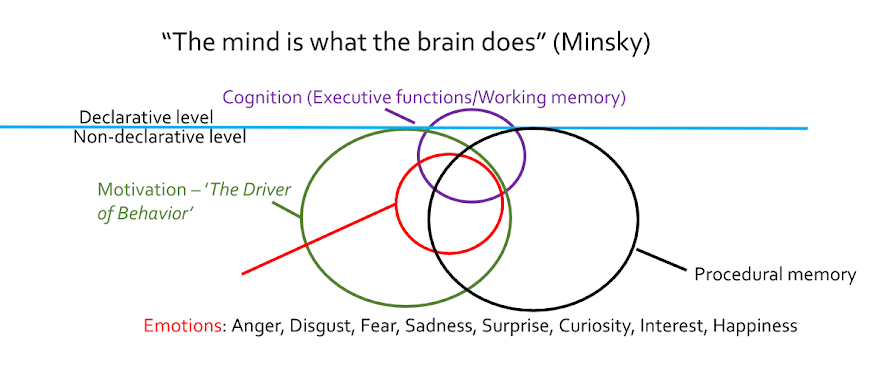Please support the blog via Swish (Sweden), MobilePay (Finland) or Wise.
People have the tendency to meet and talk about memories. Most people believe that they recall information from the past, but are they really?
In the 1950s, a housewife - Marian Keech/Dorothy Martin (1900-1992) - claimed that she had received a radio message from a planet called Clarion.
“In the early 1950s in Minnesota, Marian Keech claimed to be receiving messages from outer space. One evening in September, she received a message from the planet Clarion informing her that on December 21 of that year, the world would be destroyed by a great flood. The message went on to say that flying saucers would come from Clarion to rescue her and those close to her. Mrs. Keech, a strong and charismatic middle-aged women (directive leadership) attracted a group of about 25 followers. This group thought of themselves as called together for a special purpose—seekers of an alternative wisdom and followers of orders from the Guardians or higher beings from outer space”.Turner and Pratkanis (1998) argue that the event can be attributed to groupthink.
“Groupthink is a phenomenon that occurs when a group of well-intentioned people makes irrational or non-optimal decisions spurred by the urge to conform or the belief that dissent is impossible. The problematic or premature consensus that is characteristic of groupthink may be fueled by a particular agenda—or it may be due to group members valuing harmony and coherence above critical thought.” (Psychology Today).
The experience formed Common to all in the group, and was Stored as a episodic memory.
In another court case in Sweden, a prosecutor named Christer van der Kwast claimed that he had found a mass murder, and used the accused's own episodic memory as evidence. Eight people hired as judged did not apply epistemic vigilance (Sperber et al. 2010), instead they bought the false narrative without any question. One of them, Kristina Almquist, even requested that evidence should be banned:
“the councelor [a form of staff in a court] Kristina Almqvist, refused on the grounds that no reason had emerged to justify obtaining a written expert opinion” (SOU 2015:52; p. 536).Because the accused person received drugs as a reward when open up (telling lies), and that he was able to read about the process in the media, he became a really good constructor of episodic memory. In one case he claimed the following:
“In the letter to Kjell Persson in the fall of 1992, he had claimed that he tore open Thomas' neck with his teeth and swallowed his sphincter” (Josefsson, 2015, translated from the Swedish version, p. 241).For the trial, Christer van der Kwast had used cherry picking and assigned a psychologist famous for not using science based theories about how memory works. This became a tradition, and instead of using disjunctive reasoning (Stanovich, 2009) and checking around what other psychologists had to say about memory, the same psychologist was used by other prosecutors. Therefore, in another famous case, Swedish police and prosecutors harassed two children (~5years of age), blaming them for the death of another child.
So, if things go wrong when we consult our memory, why do our species have memory?
In order to understand the function of memory, it's important to understand the mind. The mind has three main faculties: memory, perception and prospection - experience gå the future.
Perception is the experience of the present, e.g. odor, tactile, visual, auditory, and taste.
- Memory is not for forming associations or remembering, but for simulating scenarios about the future we don't know much about (Gilbert and Wilson, 2007; Kaku, 2014).
- Memory is divided into several instances: declarative and non-declarative respectively (Graf and Schacter, 1985; Squire and Zola, 1996).
- Declarative memory is divided into semantic, episodic and personal semantic (autobiographical).
- Semantic memory relates to facts - 2+2=4, Paris is the capital of France etc. and is stable over time (ScienceDirect).
- Autobiographical memory is formed around the age of 5-6 and is susceptible to memory hacking (Nelson and Fivush, 2004; Shaw, 2016).
- Episodic memory concerns events we have been part of. When we have to remember an event, a copy of the event is not retrieved from memory. Instead, a construction of the sequence of events takes place that is adapted to the current situation (Schacter and Addis, 2007).
“Since the future is not an exact repetition of the past, simulation of future episodes may require a system that can draw on the past in a manner that flexibly extracts and recombines elements of previous experiences—a constructive rather than a reproductive system.” (Schacter and Addis, 2007 , p. 774).So, when we sit together having a conversation that centers around historical events, we probably create these events by using our imagination.
Because they shared the experience, they remained cohesive after it was revealed that there would be no spaceships. Festinger, Riecken and Schacter (1956/2008), who originally infiltrated the group wrote the following on page three in their report:
“A man with a conviction is a hard man to change. Tell him you disagree and he turns away. Show him facts or figures and he questions your sources. Appeal to logic and he fails to see your point”.Ergo. Because people share the created memory, its hard to abandon them, and therefore the false memory lives on ...
Also visit: An introduction to Peter Österberg, Ph.D.
Please support the blog via Swish (Sweden), MobilePay (Finland) or Wise.
More about my expertise:
Executive coaching for CEOs/managers and workshops to facilitate Organizational Performance, Learning, and Creativity for Problem Solving | Lectures: Nutrition for physical and mental health | Course/lecture: children's emotional and social adjustment and cognitive development | Language training - Swedish | Academy Competency | CV | Teaching skills and experience | Summary of research project | Instagram | Linkedin | YouTube-channel | TikTok | Twitter

No comments:
Post a Comment